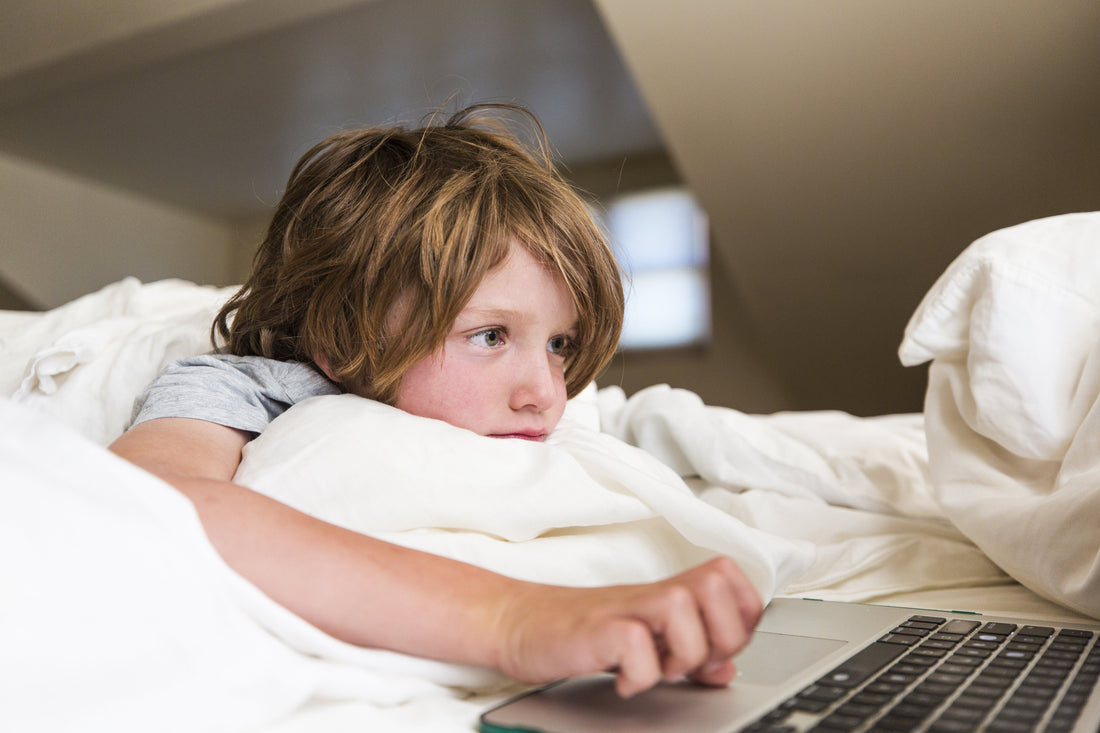It seems like every time you turn on the news, there's another story about screen time and its negative or positive effects on children. Official recommendations seem to vary based on the age of the child, the type of activity that's presented on the screen, and whether a caregiver is present to provide guidance. How can you identify fact and fiction when you're trying to make the best decision for your family? As always, look to science. Many studies have been done on the effects of various types of media on developing brains, characters, and eyes. What about emotional health, though? What are the mental and emotional symptoms of too much screen time, and how can you support your child while also limiting screens?
Symptoms of Too Much Screen Time
When a child is consistently spending too much time in front of screens, you may notice the wired-but-tired phenomenon, in which they seem too wound up to sleep but too tired to stay up. You may also see meltdowns and general irritability, as well as a preoccupation with a favorite electronic device. If your child seems more high-strung, anxious, or moody than usual, excessive screen time could be to blame. If your child seems to be developing signs of addiction, such as an inability to stop talking or thinking about the device, or if they are not able to stop using their device and it's getting in the way of their studies or the amount of sleep that they need, it's time to take some action.
How It Can Affect Mental Health
Too much time spent staring at screens can lead to depression, anxiety, and moodiness. Children who spend excessive amounts of time staring at screens are more likely to develop severe depression and low self-esteem than those who spend two hours or less on that activity each day. Screen addiction can lead to relational problems, which may limit the number of friendships your child develops. Worse, it could end your child's current friendships, which would be no good for self-esteem or mood.
Healthy & Unhealthy Amounts of Screen Time
How much screen time is unhealthy may depend on the type of screen time in question. You may have heard that active screen time is better than the passive kind. However, keeping the brain busy, for example, by playing video games, can inhibit sleep, thus causing other problems the following day. On the other hand, passive screen time, such as watching television, may not be good for brain development.
Due to the current state of the world, it is difficult to keep your children away from screens. However, if possible, limit your child’s screen time to a few hours each day with breaks in between. Encourage safe, outdoor play. As well, restrict screen time at least an hour before bed.
Ways To Limit Screen Time
There is a difference between limiting screen time and eliminating it. Attempting to remove screen-based electronic devices from your child's life may backfire. In this day of remote and technology-enhanced learning, it may be impossible, or, at the very least, impractical. Still, there are several ways you can reduce the amount of screen time in your child's life without inducing boredom.
Buy, borrow, or check out books
Although ebooks may be just as good at imparting information as physical books are, choosing paper can help boost your child's mood. Reading from paper books has been proven to be easier on your child’s eyes, better to absorb information, and beneficial towards becoming better readers.
Print some activities
If your child is learning remotely, you may be shocked by the amount of on-screen time the school requires. However, with a little forethought and planning, there's a good chance you will find at least a few activities each week that lend themselves to being printed. Whether it's a vocabulary list, note catcher, math worksheet, or something else, there should be something in the week's assignments that would translate well into print. Once your child has finished the printed work, snap a photo, and see if you can turn in the project that way.
Read aloud
Shine Brighter
Children often seek out television, movies, or apps for entertainment, even when doing other things, such as eating or doing chores. Having their eyes glued to a screen doesn't help them complete tasks with a high level of quality. However, listening to a story while they go about their business may fill that need for a bit of escape, entertainment, or novel ideas. If you can't coordinate your day to read aloud to your children during mealtimes or chore time, look for a screen-free way to play audiobooks for them, such as a voice-activated smart speaker.
Rearrange the house
Studies have shown that children with televisions, gaming consoles, or other electronics in their bedrooms get noticeably less sleep than children whose rooms are free of these devices. We can't overstate the importance of adequate sleep, especially for a young, developing brain. If your children have TVs in their bedrooms, it's time to make some changes. If you can move the TV to another place in the house, that's great. If you can get rid of it and have fewer televisions in the home, that's even better.
Schedule more outdoor time
One concern that parents often have is that their children will be bored if screen time is limited, and no one will know what to do. That may be true, especially at first. However, if children have something to look forward to, such as an outing or a game of tag in the backyard, they will be less likely to miss their devices. Also, excessive screen time has been linked with an increase in childhood obesity, so getting them outdoors to run around is a win-win.
Swap movie night for family game night or go for a walk after school
Again, it's all about making healthy substitutions. You don't have to wait for your children to get bored before you start to see the benefits of more face time and less screen time. Having a plan in place ahead of time will help by giving them something to look forward to and giving their brains a chance to work out.
Create a designated space for electronic devices to go at the end of the day
To help promote good sleep practices, collect everyone's devices and keep them in their designated location until the next morning.
Although electronic devices and the screens that go with them are here to stay, you don't have to let them take over your life (or your child's). With proper planning and a sense of commitment to your family's well-being, you can be successful in preventing or counteracting the adverse effects of too much screen time.
Studies have also shown that too much screen time can cause children to start showing symptoms of ADHD, with increased anxiety, hyperactivity, and lack of focus and attention. Controlling screen time is only one of the many ways to help change routines and habits to help reduce these symptoms. Brillia recommends a holistic approach with advice on how to improve sleep, nutrition, practice mindfulness as well as control screen time. And if you still need a little more support, then it's best to start with non-prescription options such as Brillia.







